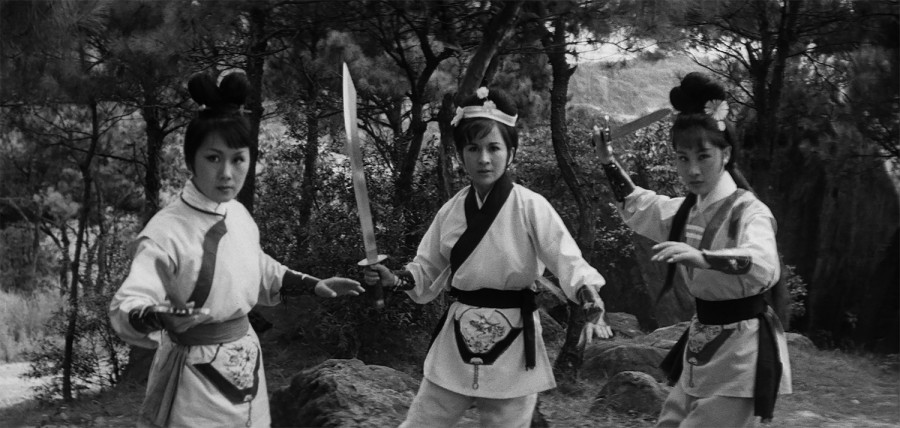Old School Kung Fu film festival returns to NYC
A collaboration between Subway Cinema, Metrograph and the Taipei Cultural Center, the Old School Kung Fu Fest is a curated series of rare and iconic films in the Taiwanese wuxia genre. Tickets are available on the Metrograph website.
“Vengeance of the Phoenix Sisters” features Yang Li-hua, Liu Ching and Chin Mei. (Courtesy of Taiwan Film and Audiovisual Institute)
April 21, 2023
On April 21, the annual Old School Kung Fu Fest makes a triumphant return to the Lower East Side’s Metrograph cinema, bringing a flurry of clashing steel and costumed vigilantes to the silver screen. In collaboration with the Taipei Cultural Center in New York, this 10th edition of the series will run for nine days, featuring a selection of films celebrating the Taiwanese wuxia genre.
The narrative tradition of wuxia, roughly translated as “martial hero,” extends far beyond the shores of 1960s Taiwan. This period was pivotal in the transformative midcentury evolution of Chinese-language cinema. Without the likes of directors such as King Hu and Joseph Kuo, the astronomic success and longevity of martial arts cinema would not have been possible.
According to Goran Topalovic, the festival’s programmer, films featured in the series “established the template for modern wuxia cinema being imitated to this day.”
This edition of the festival, which the organizers say is the ““Swordfighting Heroes Edition,” celebrates the foundational work of wuxia pioneers while introducing audiences to some of the highest-caliber action cinema that has ever graced the big screen. And while many might not expect it, the wuxia genre has deep roots in New York City culture.
Twenty-three years ago, Topalovic and his co-founders at Subway Cinema, a nonprofit dedicated to the exhibition and appreciation of Asian film culture, started the Old School Kung Fu Fest to “bring back memories of old Times Square grindhouses.” During the sociopolitical tumult of the 1970s, these derelict movie palaces on 42nd Street used to screen all sorts of low-budget independent and foreign films, often displaying excessive sex, violence and gore. It was here, on the fringes of cinema, that wuxia films made their mark on the city’s collective cultural memory, influencing a generation of local legends like the Wu-Tang Clan.
For this rendition of the festival, Topalovic brings audiences back to a watershed moment in wuxia cinema. While martial arts films flourished in earlier decades, particularly in ’20s Shanghai and ’50s Hong Kong, the blueprint for modern martial arts cinema was drawn in the mid-’60s — specifically with the revelatory works of Chinese cinema legend King Hu. Drawing from traditional wuxia literature and Beijing opera, releases like “Come Drink with Me” (1966) and “Dragon Inn’ (1967)” garnered widespread attention from Chinese-speaking audiences across the globe. This generation of Taiwanese martial arts films was the beginning of a longstanding aesthetic and narrative tradition, heavily influencing more contemporary entries to the wuxia genre like “Crouching Tiger, Hidden Dragon” (2000) and “The Assassin” (2015). As a result, these films kickstarted a renaissance in wuxia filmmaking, giving birth to a whole host of timeless masterpieces and rare gems.
Here are a few essential recommendations from the programmer that embody this dynamic era of martial arts cinema. Tickets for the following films, and the entire program, are available on the Metrograph website.
“The King of Wuxia” (2022)
This feature-length documentary film by Lin Jing-Jie is an in-depth chronicle of King Hu’s acclaimed career and compelling life story. The film is divided into two acts, the first of which explores the personal influence of his filmography through a modern lens. Frequent collaborators like John Woo and Sammo Hung, also celebrated filmmakers, reflect on the lasting impact of Hu’s aesthetic and narrative contributions to Chinese-language cinema. Actresses like Hsu Feng and Cheng Pei-pei are also featured in the documentary; according to Topalovic, Hu was responsible for cultivating “the most important female stars of that generation.”
In the second half of the film, Lin explores the many phases of Hu’s personal life, beginning with his time as a 17-year-old refugee in Hong Kong to his later emigration to the United States. “The King of Wuxia” captures the singular and evolutionary impact of a motion picture luminary. King Hu’s films, “A Touch of Zen” (1971) “The Fate of Lee Khan” (1973) and “The Valiant Ones” (1975) will also be shown at the Metrograph.
“Vengeance of the Phoenix Sisters” (1968)
Departing from the elegant opera-inspired vignettes of King Hu films, Cheng Hung-Min’s newly restored “Vengeance of the Phoenix Sisters” is a stylistically distinct entry into the canon of wuxia cinema. While still keeping dynamic swordplay and the female heroine at its core, Cheng’s use of rugged, hand-held camerawork, intimate close-ups and an experimental Chinese opera-inspired score adds an unprecedented grit to a genre so closely associated with delicate violence. Topalovic describes finding this film “a revelation,” recalling that it felt like “French New Wave doing wuxia.”
“Legend of the Sacred Stone” (2000)
One of the rarest films on the roster — and a personal highlight for Topalovic — is Chris Huang’s wuxia puppet film “Legend of the Sacred Stone.” A spinoff feature of “Pili,” a Taiwanese puppet show that dominated the airwaves in the ’80s, the film is a cinematic marvel. Shot on a soundstage, the film combines traditional puppet craftsmanship and CGI to deliver a compelling, action-packed drama. The film also immortalizes one of Taiwan’s cultural relics — the art of Po Te Hi puppet storytelling. While the form originated in China, the Huang family was instrumental in preserving the tradition and reviving the form for Taiwanese audiences. Although certainly unconventional, Topalovic hopes that more people will have a chance to see it, especially given how uncommon it is to find a screening of the full, uncut version of the film. This film is not only a testament to the diverse narrative manifestations of the wuxia literary tradition, but also a unique representation of Taiwanese culture.
Contact Mick Gaw at [email protected].


























































































































































